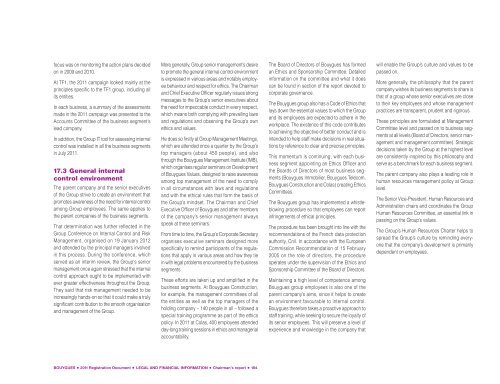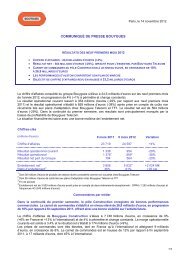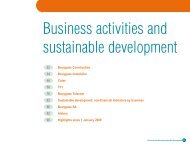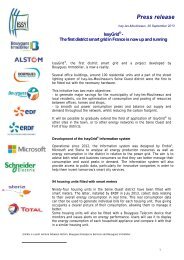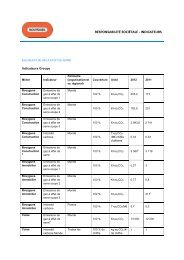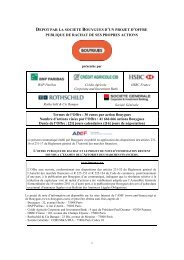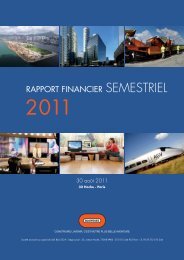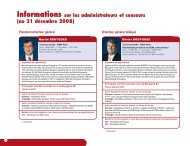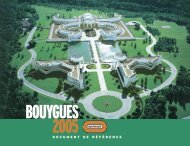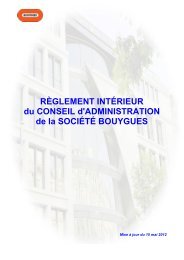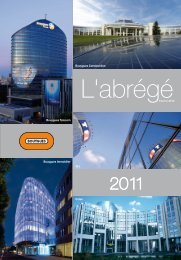Registration Document BOUYGUES
Registration Document BOUYGUES
Registration Document BOUYGUES
You also want an ePaper? Increase the reach of your titles
YUMPU automatically turns print PDFs into web optimized ePapers that Google loves.
focus was on monitoring the action plans decided<br />
on in 2009 and 2010.<br />
At TF1, the 2011 campaign looked mainly at the<br />
principles specific to the TF1 group, including all<br />
its entities.<br />
In each business, a summary of the assessments<br />
made in the 2011 campaign was presented to the<br />
Accounts Committee of the business segment’s<br />
lead company.<br />
In addition, the Group IT tool for assessing internal<br />
control was installed in all the business segments<br />
in July 2011.<br />
17.3 General internal<br />
control environment<br />
The parent company and the senior executives<br />
of the Group strive to create an environment that<br />
promotes awareness of the need for internal control<br />
among Group employees. The same applies to<br />
the parent companies of the business segments.<br />
That determination was further reflected in the<br />
Group Conference on Internal Control and Risk<br />
Management, organised on 19 January 2012<br />
and attended by the principal managers involved<br />
in this process. During the conference, which<br />
served as an interim review, the Group's senior<br />
management once again stressed that the internal<br />
control approach ought to be implemented with<br />
ever greater effectiveness throughout the Group.<br />
They said that risk management needed to be<br />
increasingly hands-on so that it could make a truly<br />
significant contribution to the smooth organisation<br />
and management of the Group.<br />
More generally, Group senior management’s desire<br />
to promote the general internal control environment<br />
is expressed in various areas and notably employee<br />
behaviour and respect for ethics. The Chairman<br />
and Chief Executive Officer regularly issues strong<br />
messages to the Group’s senior executives about<br />
the need for impeccable conduct in every respect,<br />
which means both complying with prevailing laws<br />
and regulations and observing the Group’s own<br />
ethics and values.<br />
He does so firstly at Group Management Meetings,<br />
which are attended once a quarter by the Group’s<br />
top managers (about 450 people), and also<br />
through the Bouygues Management Institute (IMB),<br />
which organises regular seminars on Development<br />
of Bouygues Values, designed to raise awareness<br />
among top management of the need to comply<br />
in all circumstances with laws and regulations<br />
and with the ethical rules that form the basis of<br />
the Group’s mindset. The Chairman and Chief<br />
Executive Officer of Bouygues and other members<br />
of the company’s senior management always<br />
speak at these seminars.<br />
From time to time, the Group’s Corporate Secretary<br />
organises executive seminars designed more<br />
specifically to remind participants of the regulations<br />
that apply in various areas and how they tie<br />
in with legal problems encountered by the business<br />
segments.<br />
These efforts are taken up and amplified in the<br />
business segments. At Bouygues Construction,<br />
for example, the management committees of all<br />
the entities as well as the top managers of the<br />
holding company – 140 people in all – followed a<br />
special training programme as part of the ethics<br />
policy. In 2011 at Colas, 400 employees attended<br />
day-long training sessions in ethics and managerial<br />
accountability.<br />
The Board of Directors of Bouygues has formed<br />
an Ethics and Sponsorship Committee. Detailed<br />
information on the committee and what it does<br />
can be found in section of the report devoted to<br />
corporate governance.<br />
The Bouygues group also has a Code of Ethics that<br />
lays down the essential values to which the Group<br />
and its employees are expected to adhere in the<br />
workplace. The existence of this code contributes<br />
to achieving the objective of better conduct and is<br />
intended to help staff make decisions in real situations<br />
by reference to clear and precise principles.<br />
This momentum is continuing, with each business<br />
segment appointing an Ethics Officer and<br />
the Boards of Directors of most business segments<br />
(Bouygues Immobilier, Bouygues Telecom,<br />
Bouygues Construction and Colas) creating Ethics<br />
Committees.<br />
The Bouygues group has implemented a whistleblowing<br />
procedure so that employees can report<br />
infringements of ethical principles.<br />
The procedure has been brought into line with the<br />
recommendations of the French data protection<br />
authority, Cnil. In accordance with the European<br />
Commission Recommendation of 15 February<br />
2005 on the role of directors, the procedure<br />
operates under the supervision of the Ethics and<br />
Sponsorship Committee of the Board of Directors.<br />
Maintaining a high level of competence among<br />
Bouygues group employees is also one of the<br />
parent company’s aims, since it helps to create<br />
an environment favourable to internal control.<br />
Bouygues therefore takes a proactive approach to<br />
staff training, while seeking to secure the loyalty of<br />
its senior employees. This will preserve a level of<br />
experience and knowledge in the company that<br />
will enable the Group’s culture and values to be<br />
passed on.<br />
More generally, the philosophy that the parent<br />
company wishes its business segments to share is<br />
that of a group whose senior executives are close<br />
to their key employees and whose management<br />
practices are transparent, prudent and rigorous.<br />
These principles are formulated at Management<br />
Committee level and passed on to business segments<br />
at all levels (Board of Directors, senior management<br />
and management committee). Strategic<br />
decisions taken by the Group at the highest level<br />
are consistently inspired by this philosophy and<br />
serve as a benchmark for each business segment.<br />
The parent company also plays a leading role in<br />
human resources management policy at Group<br />
level.<br />
The Senior Vice-President, Human Resources and<br />
Administration chairs and coordinates the Group<br />
Human Resources Committee, an essential link in<br />
passing on the Group’s values.<br />
The Group’s Human Resources Charter helps to<br />
spread the Group’s culture by reminding everyone<br />
that the company’s development is primarily<br />
dependent on employees.<br />
<strong>BOUYGUES</strong> • 2011 <strong>Registration</strong> <strong>Document</strong> • LEGAL AND FINANCIAL INFORMATION • Chairman's report • 184


